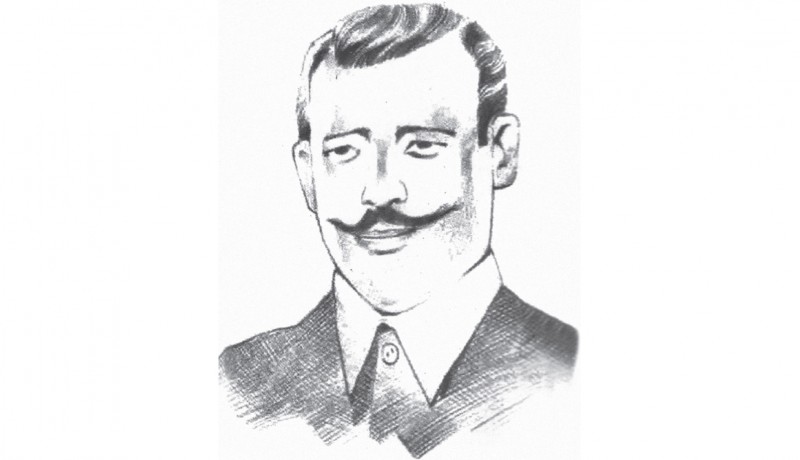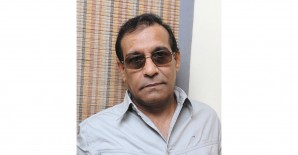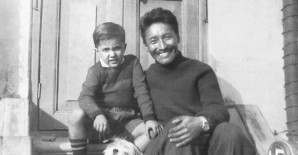
Columns

Little-known Norman Pritchard was the first Indian star in Hollywood and the first Indian to win an Olympics medal, writes Raju Mukherji
The first Indian actor to hit the headlines as a Hollywood hero was a person by the name of Norman Trevor. The first Indian to win an Olympic medal was an athlete who answered to the call of Norman Pritchard. Both these Normans happened to be the one and the same person!
Even before Rabindranath Tagore and Mohandas Gandhi became household names, this young Indian was making waves in the western hemisphere. Baptised Norman Gilbert Pritchard, the handsome gentleman was a Calcuttan by birth; an Indian by nationality.
Who was he? What is his relevance today? By dint of his exploits a little more than a hundred years ago, this now-forgotten individual put India on the map in Hollywood, on Broadway and, most important, at the Olympic Games. His name and fame rest on a tiny statistic that involves complex technical issues.
Of British parentage, Norman Gilbert Pritchard happens to be the first Indian to win honours in the Olympic Games. In 1900 at the Paris Olympiad—the 2nd of the modern Olympic Games—the handsome athlete’s blistering speed on the race track left the world’s best runners leaden-footed. He was garlanded with the silver medal in the 200-m sprint. To prove it was no fluke, he won the silver medallion in the 200-m hurdles, an event that was discontinued in 1904 after the St Louis Olympic Games.
Olympic researchers have dived deep into Pritchard’s career to trace his nationality. Some felt that Britain, not India, should be credited with Pritchard’s medals as his parents happened to be from Britain! Some years ago, Olympic Games scholar David Wallechinsky, son of author Irving Wallace, was also undecided about Pritchard’s nationality. In his authoritative book on the modern Olympics, The Complete Book of the Olympics, he has credited Norman Pritchard with dual nationality. He mentioned that Pritchard’s silver medals should be credited both to Britain and India as Pritchard’s parents were British and he was born and bred in Calcutta, then the capital city of British India.
Erudite Indian sports historian Gulu Ezekiel and I put forward our argument and convinced the International Olympic Committee (IOC) that the medals rightly belonged to India, not Britain. What was our contention?
Actually, Norman Pritchard was born in Alipore on the southern periphery of Calcutta on 23 June 1875. He studied at the Jesuit-run St Xavier’s School on Park Street (now, Mother Teresa Sarani) in Calcutta and graduated from St Xavier’s College, again in Calcutta.From Alipore, he shifted residence to a bungalow on Sarat Bose Road (then Lansdowne Road) and worked for Bird & Co in the thriving jute trade of the late 19th century. His parents were Gilbert Peterson Pritchard and Helen Maynard Pritchard. It may be pertinent to note that like many Indians, Norman took his father’s first name as his own second name. His full name, to repeat for emphasis, happened to be Norman Gilbert Pritchard.
While in Calcutta, Norman Pritchard was involved in athletics, soccer and rugby. Apart from winning several athletic championships in India and Europe, he was also involved with the Indian Football Association, both as a player and administrator. His record of seven consecutive 100-yard sprint titles at the Bengal Presidency athletic meet still stands.
Norman Pritchard was a permanent resident of India from his birth in 1875 to 1913. Thus at the time of winning the Olympic silver medals in 1900 he was an Indian by birth and residence. The eventful story of Norman Pritchard does not end here. My research at the Goethal’s Library in Xavier’s College revealed that he went off to Hollywood in 1913 and made an instant impact as a hero in the silent films of the period. In Hollywood, he changed his name and was known as Norman Trevor. He was highly successful as an actor between 1914 and 1926, both on screen and stage.
According to Olympic scholar David Wallechinsky, “he acted in 27 Hollywood movies, notably Dancing Mothers (1926) with Clara Bow, Beau Geste (1926) with Ronald Colman and The Love Trap (1929), which was directed by William Wyler.” Thus, he becomes the first Indian to hit the headlines in Hollywood as a film star, far ahead of any other India-born film actor or actress. He also is the pioneer sports personality to don screen costumes, as Olympian Johnny Weissmuller of Tarzan fame, among others, was to do later.
Unfortunately, film historians in India have never given this man his due recognition. No one in film circles seems to have heard of him! It appears the worlds of sports and films in modern India have no time for their own history and heritage—a pathetic scenario indeed!
In fact, Norman Pritchard, publicised in his altered name as Norman Trevor in the US media, was especially brilliant on stage. The multi-dimensional talent acted in no less than 28 plays on Broadway between 1914 and 1926, thereby becoming again, without an iota of doubt, the first from India to gain honours as an actor on the international platform.
Most unfortunately, the great former athlete succumbed to the glamour of the tinsel world. Highly volatile and erratic in behaviour he always was; in the US, he went berserk. He probably suffered from Alzheimer’s late in life and spent time at a mental asylum. He died a pauper in Los Angeles on 31 October 1929 of a brain malady. His wife had left him earlier and returned to their homeland in India.
In Calcutta, no one was concerned with his acting skills. It was the indelible memory of the magnificent athlete that stayed in the mind. Norman Pritchard left behind a host of admirers. One of them was Cecil Leeming—himself a proud Indian of British parentage—who went on to don the cassock of the Society of Jesus and was associated with St Xavier’s for decades.
Reverend Cecil Leeming himself was an outstanding athlete. He was a certainty in the Indian athletics contingent to the Berlin Olympic Games in 1936. But the young Leeming could not take part as it coincided with his priesthood duties and studies. I am sure if Reverend Leeming had been able to take the plunge, he would have made both my alma mater St Xavier’s and India as proud as Norman Pritchard did.
Cecil Leeming always maintained that although Pritchard had British parents, he was an inspiration to a generation of Calcutta athletes and would never have considered himself to be anything but a ‘pucca’ Bengali. With his hearty laugh, he once said, “Dad used to regale us with Pritchard’s exploits. Pritchard loved his luchee and kasha-mangsho. A typical Bong he was, my idol; he loved his food!”
Interestingly, it is on record that Pritchard was the first Indian footballer to score a hat-trick of goals. The match was between St Xavier’s College and Sovabazar, then a famous Calcutta football club, in July 1897. A natural sportsman, he seemed extremely adept at whatever sport he attempted. Cricket, of course, was too slow and laborious for a man of his restlessness.
In 1900, the Olympics in Paris coincided with the international exhibition in the city and had stretched over many a month. Those days, the question of nationality did not arise at the Olympics because there were no official Olympic committees of individual countries; the participants competed on their own. Hence, Pritchard’s two silver medals remain his very own.
As he was born and bred in Calcutta, there is no earthly reason to think he went to the Paris Olympics in 1900 as a representative of England. Pritchard did go to Europe, including Britain, several times during his life to take part in athletic contests as well as for vacations, but never did he reside long enough in England to be considered British by residence or nationality.
Ethnicity-wise, British most certainly; but nationality-wise, never. Also, consider this. If Pritchard were to be considered a British athlete, what would be the status of cricketer Ranjitsinghji? Ranji was not born in England, nor did he have English parentage.
Yet, based in England, he represented England. India accepted he was an England cricketer by residential qualification and, quite rightly, never claimed Ranji was an Indian cricketer because of his Indian parentage. By that argument, if Ranji, then, is considered an England cricketer, Pritchard most certainly would qualify to be an athlete representing India!
Thankfully, the IOC accepted Gulu Ezekiel’s and my version and credited India with Pritchard’s two silver medals at the 1900 Paris Olympics. Indeed, Norman Pritchard deserves to be an icon for every Indian. Now that he has been discovered and his outstanding abilities unearthed, let us give the man his due.
Kolkata-based Mukherji is a former cricket player, coach, selector, talent scout, match referee and writer
Featured in Harmony — Celebrate Age Magazine July 2018
you may also like to read
-
Mental workout
Mukul Sharma tells you how to keep those grey cells ticking Everyone will ultimately lose his or her brain….
-
Helpline
Dr Harshbir Rana answers your queries on personal and social issues related to ageing, elder care and intergenerational relationships ….
-
Off the cuff
Raju Mukherji pays tribute to his first hero, Tenzing Norgay, an exemplary mountaineer Darjeeling, 1955. Dr ‘Pahari’ Guha Mazumdar….
-
Yoga RX
Shameem Akthar shows ways to control debilitating ankle pain through regular practice Ankle pain is so common and prevalent….







